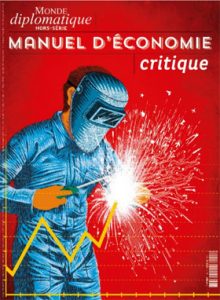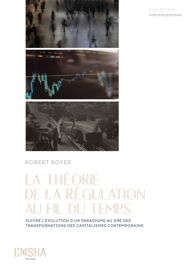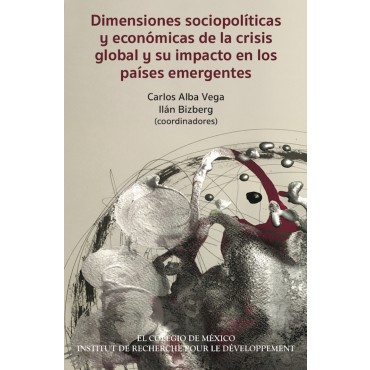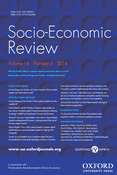Intervenants : Robert Boyer (Centre Cournot, Institut des Amériques), Xavier Ragot (OFCE), Les débats du Centre Cournot, en ligne, mars 2020.
Suivre l’évolution d’un paradigme au gré des transformations des capitalismes contemporains, R. Boyer (dir), Avril 2018, Editions des maisons des sciences de l’homme associées, Collection interdisciplinaire EMSHA , La Plaine Saint Denis.
This book presents the reader with an insight into the intellectual trajectory of a group of researchers who have sought to shed light on certain questions related to research on economics and society according to the approaches developed by the Theory of Regulation. through a permanent back and forth between the teachings and predictions of the conceptual framework developed to account for the rupture of the glorious Thirties and the reality of the evolutions observed since then.
The peculiarity of this book is to show the adjustment of this paradigm from year to year until the contemporary period. In a way, he proposes to visit the laboratory from which came the numerous publications derived from the Theory of Regulation.
 Amiens2017def (16.4 MiB)Prepared for the Colloquium on Money, Debt and Sovereignty, Amiens University, 11 December 2017.
Amiens2017def (16.4 MiB)Prepared for the Colloquium on Money, Debt and Sovereignty, Amiens University, 11 December 2017.
In Carlos Alba Vega y Ilán Bizberg (coordinadores), Dimensiones sociopoliticas y economicas de la crisis global y su impacto en los paises emergentes, Publication Ciudad de Mexico, el Colegio de Mexico, Centro de Estudios Internacionales, Institut de Recherche pour le Développement, 2017, p. 39 – 83.
Socio-Economic Review, Discussion Forum: “Brexit: understanding the socio-economic origins and consequences” , 2016, Vol. 14, n° 4, p. 836-845.
Abstract
Jacqueline O’Reilly, Julie Froud, Sukhdev Johal, Karel Williams, Chris Warhurst, Glenn Morgan, Christopher Grey, Geoffrey Wood, Mike Wright, Robert Boyer, Sabine Frerichs, Suvi Sankari, Akos Rona-Tas and Patrick Le Galès
The unprecedented geopolitical shift resulting from Brexit reflects deep socio-economic fault lines within and beyond the UK. In many ways foreshadowing the US presidential election of Donald Trump, Brexit brought to the surface and gave a public voice to socio-economic divisions that were deeply embedded, sometimes illogical, but until now had either been ignored or hushed out of ‘respectable’ public debate. This Discussion Forum emanates from a spontaneous seminar organized 2 days after the Brexit vote on June 25, 2016 as part of the SASE conference held in University of California–Berkeley and followed by an open call for papers by Socio-Economic Review. The papers here draw attention to the origins of the Brexit vote in deep-seated socio-economic divisions (O’Reilly), widening differences in economic performance across sectors and regions of the UK (Froud, Sukhdev and Williams) and the growth of poor quality jobs (Warhurst). Meanwhile, the political dynamics of the Brexit vote were also shaped by the fractured nature of UK business elites (Morgan), divisions between locals and cosmopolitans (Grey) and creative but muddled actions of elites that arguably generated consequences they themselves failed to fully anticipate (Wood and Wright). From the perspective of Europe, Brexit reflects a history of dysfunctional economic policy in Europe that prioritized market competition in ways that neglected and ultimately undermined solidarity (Boyer). Here, Brexit reflects a political strategy to both renationalize and recommodify solidarity in the face of fears over migration, and which are likely to have major consequences for social solidarity in Europe more generally (Frerichs and Sankari). However, Brexit is unlikely to provide a durable social and political solution to the wider tensions between globalization and democracy, which also affect all countries throughout Europe (Rona-Tas). Ultimately, the Brexit vote underlines social divisions that combine class inequalities with regional ones, not just in Britain but throughout Europe (Le Galès).
 in manual of critical economics, world diplomatic, Special Edition, 2016, p. 166-167.
in manual of critical economics, world diplomatic, Special Edition, 2016, p. 166-167.
Toulouse – 15 September 2016
Presentation of the “Manual of critical economy.”
On Thursday, September 15, at 20 h 30, room of the Seneschal, presentation of the “Handbook of critical economy” with Renaud Lambert and Hélène Richard.
By signing the failure of liberal theories, the financial meltdown of 2008 could encourage Western Governments to renew their economic policies. She has instead tightened the shackles of neoclassical economics, in the morning Chronicles as in textbooks.
The contre-manuel of the diplomatic world intends to reverse this logic. His ambition? Make it accessible to the larger economy and highlight the nature policy. In short, remember that, as the public thing, the economy is everyone’s business. And allow everyone to seize through four objectives:
- provide a historical and international lighting often forgotten;
- introduce the analysis of schools of thought marginalized in universities and private access to the media;
- debunk conventional wisdom that install the fatalism in the minds;
- clear the horizon by recalling that other avenues open to us.
Renaud Lambert and Hélène Richard are members of the editorial staff of the diplomatic world they both coordinated the realization of the critical economy manual.
The diplomatic world is tackling misconceptions about free trade, finance, the sharing of wealth, etc.
Mechanisms within the reach of all
From the economy first and senior programs
Inscrutable equations, enigmatic curves, nebulous reasoning… The dominant economy invites to a double renunciation: in front of the technical difficulties of a universe that is reserved for the experts, on the one hand; front of the immutable scientific “laws”, on the other. The contre-manuel of the ‘diplomatic world’ intends to reverse this logic. His ambition? Make it accessible to the larger economy and highlight the nature policy. In short, remember that, as the public thing, the economy is everyone’s business. And allow everyone to seize.
There is urgency: by signing the failure of liberal theories, the financial meltdown of 2008 could encourage Western Governments to renew their economic policies. She has instead tightened the shackles of neoclassical economics, in the morning Chronicles as in textbooks.
We have therefore gathered some of the specialists of the most lucid economy – researchers, teachers of University and high school students, journalists – around first and senior programs to offer ‘our’ treatment. Around four objectives: contribute a historical and international perspective often forgotten programs; introduce the analysis of schools of thought marginalized in universities and private access to the media; debunk conventional wisdom that install the fatalism in the minds; clear the horizon by recalling that other avenues open to us.
Away from the dogmas, our manual invites to put the economy at the service of society.
Read “the economy as never explained you it” by Renaud Lambert and Hélène Richard in ‘Le Monde diplomatic’ September 2016
Contributed to this manual:
Samir Amin, Guillaume Barou, Aurélien Bernier, Sophie Bedford, John Bertrand, Robert Boyer, Benoit Bréville, Martine Boston, Mona Chollet, Laurent Shoemaker, François Denord, Xavier Devetter, Cedric Durand, Frédéric Farah, Cyrille Freeman, Jean Gadrey, Paul Guillibert, Serge Halimi, Michel Husson, Sabina Issehnane, Raoul Marc Jennar, Renaud Lambert, Serge Latouche, Frédéric Lebaron, Sylvain Leder, Frédéric Lemaire, Frédéric Lordon, Jean-Marie Monnier, Caroline Oudin-Bastide, Juan Miguel Pérez , Evelyne Pieiller, Michel clip and Monique Pinçon-Charlot, Dominique Plihon, Laura Raim, Christophe Ramaux, Gilles Raveaud, Mathias Reymond, Hélène Richard, Pierre Rimbert, François Ruffin, Pierre Salama, Emilie Sauguet, Alexis Spire, Philippe Steiner, Tinel Bruno, Julie Valentin, Julien Vercueil, Ibrahim Warde, Arnaud Zacharie, Daniel Zamora.
Especially in the summary:
- Public debt, does cost?
- Schools of economic thought
- How the credit card was invented
- Flexible working, the impasse
- Where free trade agreements?
- What does a financial crisis?
- With the onslaught of the state charity
- These wars at the service of trade
- Basic income, a utopia?
Available on newsstands September 8, 2016
-Format: 21 cm X 28.5 cm
-Number of pages: 196
-Delivery within 3 weeks
List of chapters:
I. a science like the others?
II. Produce more, always more!
III. The bridge and the hold
IV. Sharing the wealth: hopes and dead ends
V. employment, at what price?
VI. The market or the construction of a no-brainer
VII. Globalization: the competition of peoples
VIII. Currency, an Enigma ringing and stumbling
IX. Debt: the blackmail
X. Finance: the unsustainable promise





